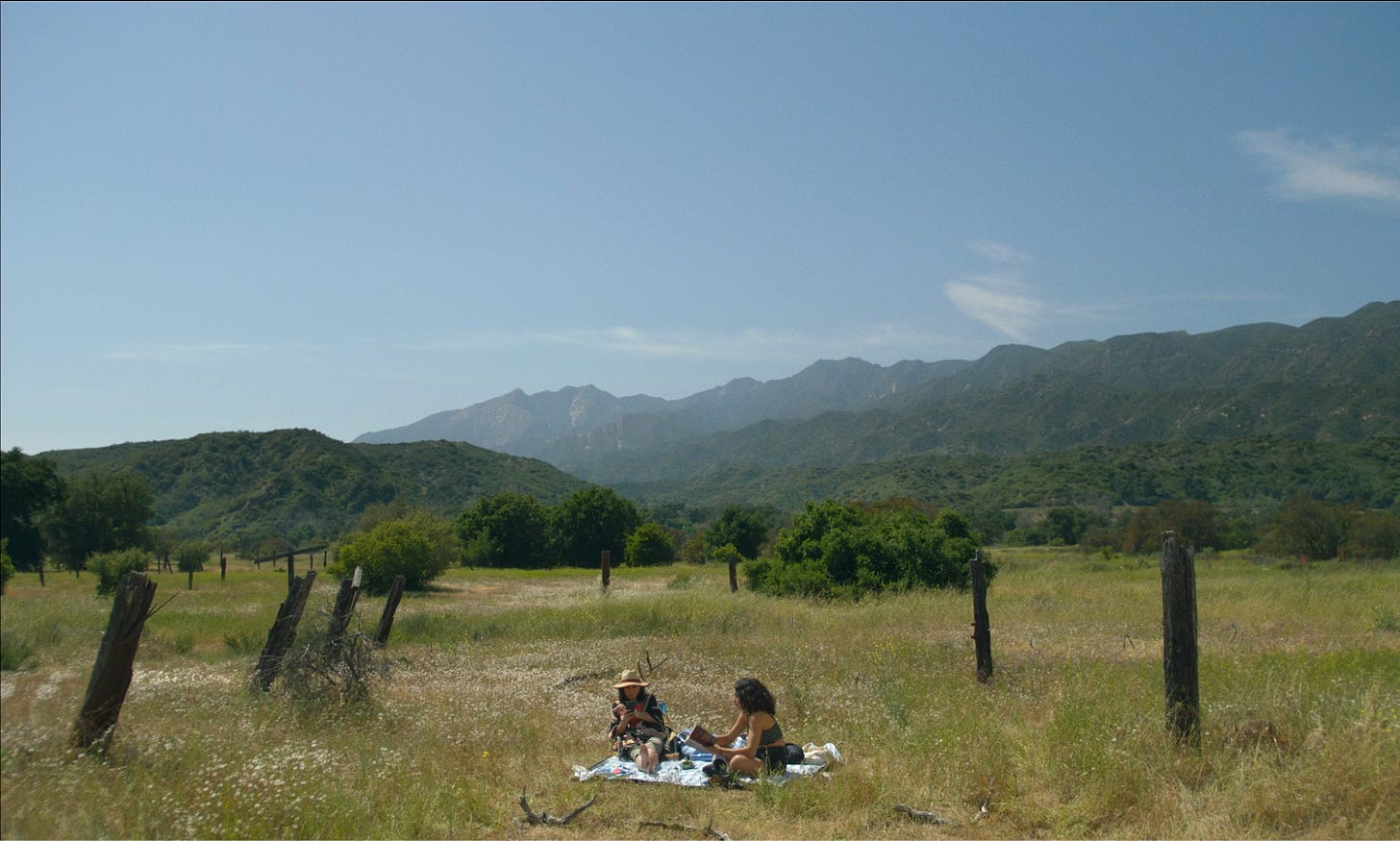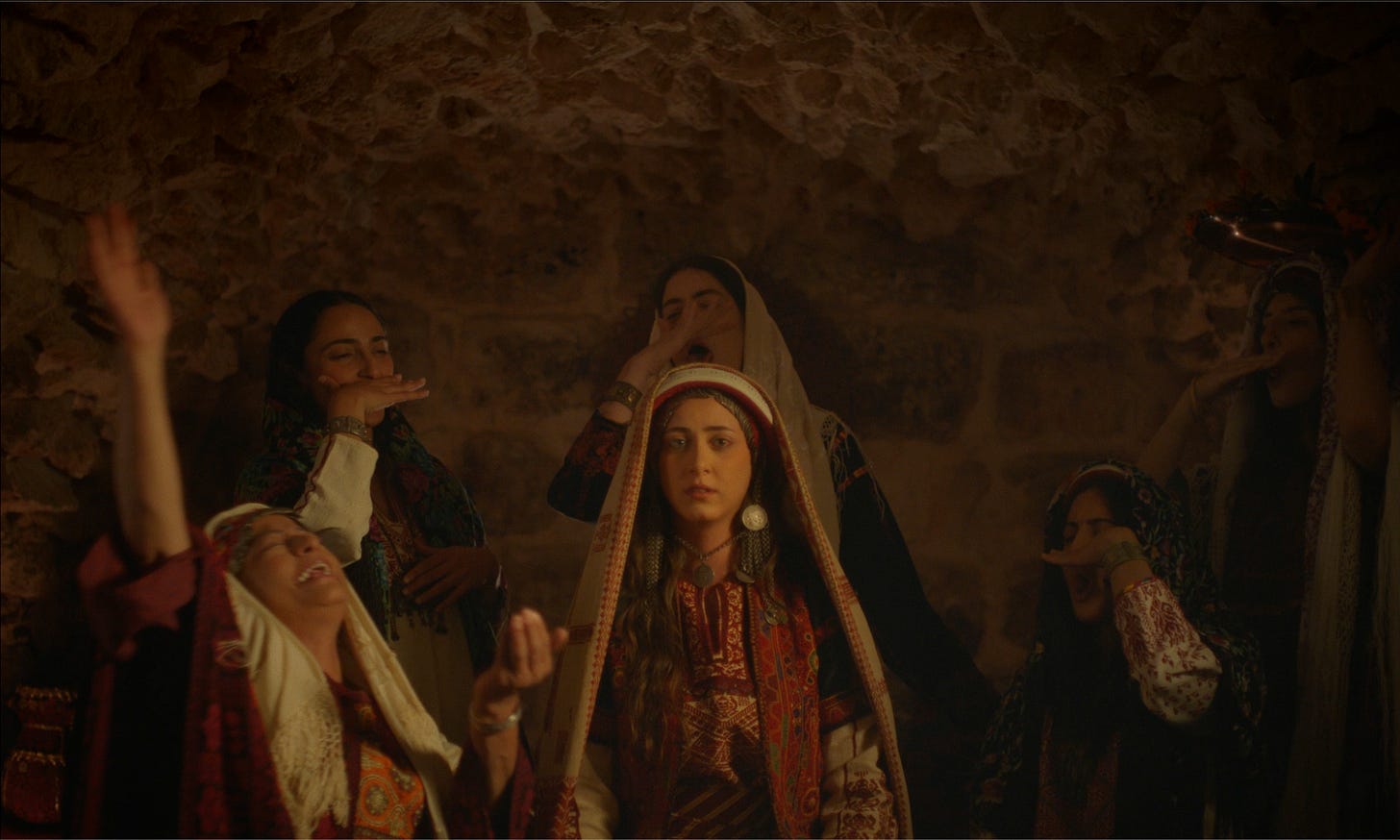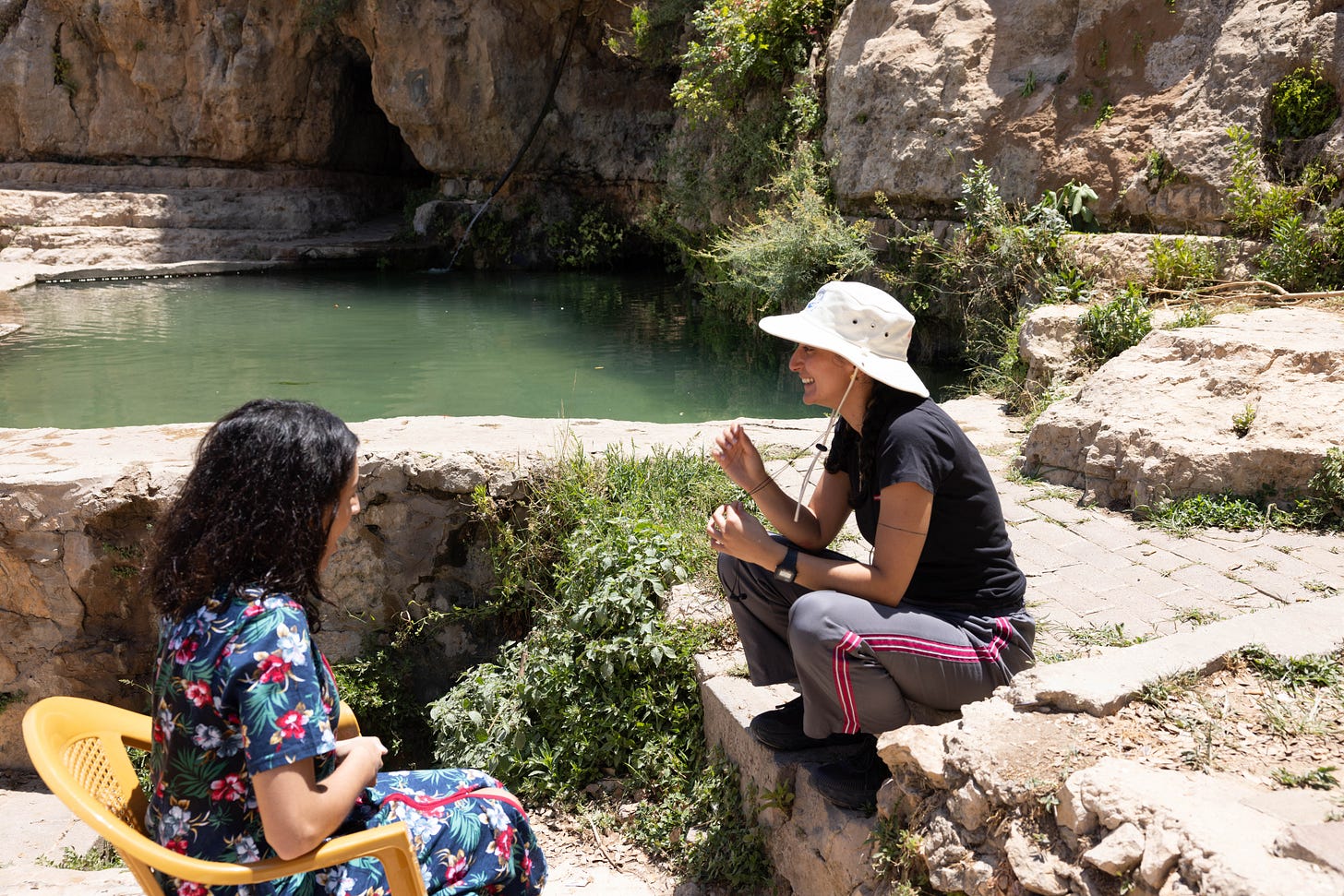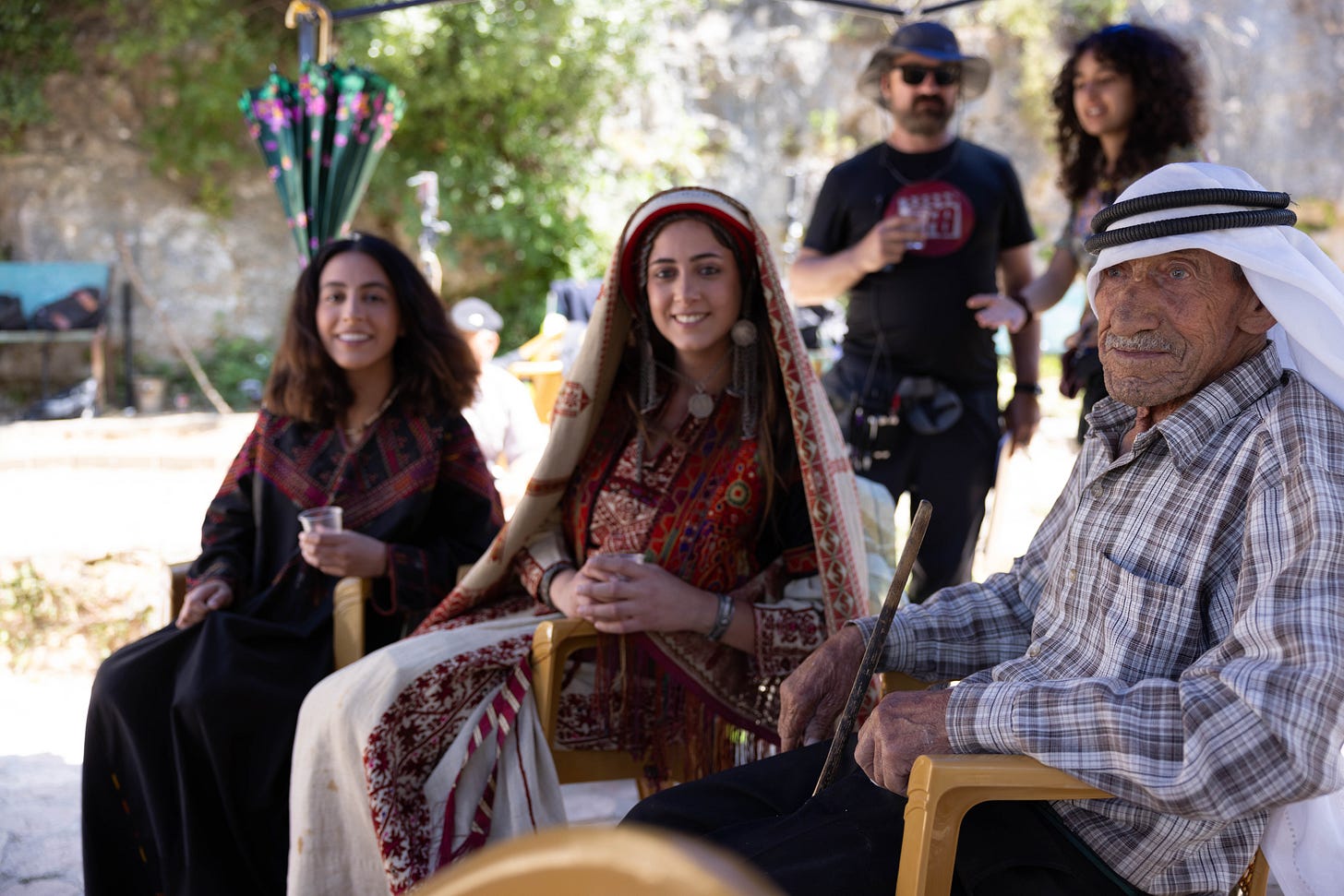Two years into the ongoing genocide of Palestine by Israel, enabled by the United States, it can feel helpless trying to understand just how to engage with it meaningfully or even help at all. As we take in horrifying footage, be it on the news or in documentaries, an image of Palestine emerges: A country left in ruins, a people erased. While that is, of course, horrendously accurate with each passing day, it leaves out a Palestine and its people that was, and are, a thriving community full of hopes, dreams, passions, artistic pursuits, love, and everything else that makes us human. It flattens the image into a digestible cause, one easy to empathize with, but removes the context and history of a people who have lived there for centuries. We shouldn’t need to see death and destruction to find the common ground that exists all around us. One way to do that is by engaging in art created by Palestinians.
Palestine has a rich, textured history in film from Mustafa Abu Ali and his cinema as protest, all the way to women like Susan Yousef and her modern masterpiece, Habibbi, cinema flourishes in the region and always has. Continuning that legacy is Palestinian-American filmmaker Reem Jubran with her stunning new short Don’t Be Long, Little Bird.
At a crossroads in life, Rima (Banna Bazzarie), finds herself transported from a quiet picnic with her mother (Clara Khoury) into 1930s Palestine, brought face-to-face with her great-grandmother. As she comes to understand her familial history, Rima’s path in life becomes much clearer, with all signs pointing to a return to her homeland.
Shot in California and Palestine, Don’t Be Long, Little Bird isn’t simply a time-traveling fairy tale wherein a young woman comes of age. The film is an act of protest in the face of oppression. It’s a filmmaker expressly embracing her roots on screen, threading her reality as an American and Palestinian. While we see one vision of Palestine presented to us by mainstream media, Jubran presents the country she knows with the people who have shaped her. Three generations of Palestinian women get to share the screen in some capacity, simply existing as people, all set against the backdrop that is the beauty of Palestine. It’s a film that shows that you don’t need to depict pain and suffering to elicit empathy and understanding. The most powerful messages of resistance are often those where people simply exist as people, in the face of forces seeking to remove them. Living, thriving within their joy.
Beyond what the film means in the macro, as cinema, it’s a stunner. Gorgeous and colorful, DP Gionatan Tecle’s compositions are spellbinding. The fantastical elements are approached with a delicate, unshowy hand by Jubran. It’s refreshing to see such confidence in this kind of material. A lesser filmmaker might spend far too long explaining the how and why of the time-travel. Here, we’re trusted to follow along with Rima as she puts the pieces together herself. This is only Jubran’s second short, but her hand is as sure as anyone's. It’s a remarkable work.
I recently sat down with Jubran upon the release of Don’t Be Long, Little Bird. We spoke about the film, how it came to her, the magic catharsis of shooting in Palestine, and her desire to see less grieving from Western supporters of the Palestinian cause and more action.
You can view the film via Focus Features’ YouTube channel for free, here. After you finish (watch through the credits, always!), come back here for a great conversation with Reem Jubran. She’s the real deal, and I expect to see so much more of her in the years to come.
What immediately hit me while watching the film was, and I'm sure it was something that you had been working on for a very long time but how have the last almost two years affected the film in your mind?
Reem Jubran: Well, to clarify, I shot the film six months before the genocide started. I was like, I want to contribute and participate with my people over there, people who are at my level, fellow students, as much as possible. I felt like I had already had my Hollywood experience, even though it doesn't work like that. I was hoping to have a different experience, so it affected it in my plans. Mentally, I was in post-production in Los Angeles, editing the film while experiencing the live stream of the genocide. Everything was delayed. For six months, I didn't really do much, maybe it was four to six months, just kind of not doing much work. Life was kind of on hold for a bit there.
As editing started to pick up the pace, and we were hitting really great milestones, it really just felt like a refuge. Every time I'd go to the editing suite on campus at UCLA, it was just a day of disconnecting from the news. It was a day of disconnecting from everything. It was like I was escaping into the movie just as the character was escaping into her world of Palestine. Every time I watched the film, every session, my editor and I were just emotional and in tears. Tears went into this movie. Anyways, we were safe, but yeah, it was emotionally loaded. It was emotionally heavy and already is an emotional story.
I felt like I was escaping and connecting to Palestine every time we were in the editing suite versus what I think other people's natural reaction, which is to kind of disconnect maybe from the Palestine that they knew, because part of what we've been going through as Palestinians the past two years is mourning the version of Palestine that we knew. There's no going back now, whether it's Gaza or the West Bank and even 48 territories, nothing is the same, and physically, emotionally, people-wise. In a way, I was like, it was my last hold on to what I knew.
I don't think many Westerners get to see many films shot in Palestine. It made me think a lot about the way Western media depicts Palestine in a certain way, in a very harsh way, to be generous. What did it mean to you to be able to show Palestine as it actually is and how you know it?
Yeah, that's a great question. This was kind of like for me, as a first generation, born in the U.S., this was my coming out story in a way. An identity story, the Palestinian-American identity. There are so many of us out here. Coming out with this story, combining the two worlds, combining the two stories, my story, my grandmother's story, in the film it's my great-grandmother, but bringing this story to light, the Palestinian-American who returns to Palestine — redirected to Palestine — that's who I am. That is what happened to me at age 17. The story is based on me begging to my mom and my sisters, “I want to go to Ecuador.” I had gotten into this program, and they were like, "Hell no. You're going nowhere." <laughs> The quote from the film is literally what my eldest sister said. She's like, "Go help your own people first." It turned out that they helped me when I went at age 17.
This film, in many ways, is telling my story about who I am as a Palestinian-American in a way that isn't trying to pretend that I'm not American. I have written many scripts that take place in Palestine from a Palestinian woman's perspective in Palestine, but none of them happened. None of them were shot. I'm happy they weren't because it was important for me to explore who I am and share that with the world first, since so few of us have a voice in this industry. I'm happy and I'm proud to bring this story to the American audience so that they know that we're here, so that they have a new perspective of what Palestine looks like, what it feels like, what it sounds like, what the women are like. That is the most important to me. They may not see how it's connected to social justice on the surface, but at its core, this film is a form of resisting erasure. I'm happy that it does that.
Yeah, there are so few Palestinian narratives in Western media at all; existing is absolutely an act of resistance. You're just showing a couple of women connecting, and there’s something so lovely about that, where it's just an everyday story. It could exist anywhere, but it’s so important that it’s Palestine. What’s something you wish people, specifically “well-meaning” people, understood about Palestine that isn’t talked about enough?
Oh, where do we begin? <laughs>
Anywhere you want! <laughs> It’s such a loaded question, we can connect it to the film if you’d like.
Maybe because it is a huge question. We can connect it back. There are so many things that Westerners need to realize in general towards the whole world, and I think Palestine is just a fraction of that. I think that, and this does connect to the movie, I wish that people knew how much rich history and culture emerged from Palestine. This is connected to the wider issue in the U.S. education system that I'm sure you're very aware of. <laughs>
Oh yeah.
We missed out on a lot down here in school. <laughs> With the film, and going hand in hand with your question, is that I want people to know that we exist, that we have been existing. I can trace back my lineage, my paternal lineage on both sides, for generations just by how names are passed down. We don't have to explain to anyone that we exist because we know, and it shows in our language, it shows in our embroidery, it shows in our cuisine, it shows in our music.
In a way, the film and what my message to the world and my hope is, we don't have to justify our existence to anyone. I think the film does that by not being overtly Palestinian in a way that Westerners are used to seeing, whether it's through Palestinian media or Palestinian depictions. That being said, the film also is not what I would say the U.S. is used to seeing, which is a lot of documentary realism, things that are happening in real time in Palestine right now, whereas mine may seem like this airy fairy romanticized thing. No, it's not. It's not romanticizing reality. I'm recreating the past in order to understand it.
Well, I think that’s important. Western media seems to only be able to show Palestine as one thing. It’s like we need a harrowing documentary or news footage to find our empathy, and it shouldn’t be the case. There’s something so important that this is not only proudly Palestinian but proudly full of life. Again, it’s just women connecting and living. To that point, how did you cast them?
The main character, who played Rima, is a Palestinian American non-actor. I cast her because of her connection to the story. She's actually one of my really good friends. I saw how natural she was and cast her. I did put a call-out, and unfortunately, I didn't find any. The pool of Palestinian actors is so small in the U.S., and I wanted to find someone who exhibits the personality of a very headstrong, kind of bratty, stuck in the high school mentality that we all were in. She also speaks Arabic and English. Those were literally my criteria because of where I was at. Banna, her name is Banna Bazzarie. From the get-go, she was working with me on creative development with the film just for fun. The time travel element was her idea. I was like, "Okay, I have two timelines and they're going to happen at the same time, and we're going to jump, and it's going to be really complex." She was like, "Reem, what if she just time-travels?" She's an amazing collaborator in so many ways. She held the American identity with a lot of pride for me.
Then you have Clara Khoury, who is actually a very seasoned actress from Palestine, but has been based in the U.S. for 10 years. She kind of had a hiatus from acting, and now she's leading award-winning Palestinian films. She's back at it. My film was her return back into cinema, and I was very proud of working with her.
That’s incredible.
Yeah! She's amazing. She's known for The Syrian Bride. She's amazing. Her being seasoned really helped tie the trinity of the Palestinian mother, daughter, grandmother lineage together. Then the great-grandmother who meets Rima in Palestine was played by Muna Basha, and she has a theater background in Palestine. Very talented as well, but not so credited in cinema. I was very happy to find talented women.
It’s sort of amazing that you naturally found these three women from extremely different walks of life to play three women onscreen, all representing women in vastly different stages of their lives.
Kind of accurately, yeah, naturally and accurately. Banna's first generation, born in the U.S.. Clara has been in the U.S. for more than 10 years. She's a Palestinian-American mom. She has two kids who were born in the U.S.. She is raising a ten-year-old girl in the U.S., and dealing with that, it's heavy, and it's what I'm a product of as well. It’s all connected.
Who were some of the filmmakers who have influenced you, not only on the film but in general?
Well, I have been heavily influenced by Palestinian cinema since I was 15 years old, namely Annemarie Jacir and Elia Suleiman. My aunt's the founder of the Arab Film Festival. My sister, when I was 15, was the director of it. She introduced me to Arab Cinema in general. I was mind blown when I saw Salt of the Sea by Annemarie Jacir, because it's about a Palestinian-American who returns to Palestine for the first time and demands what's rightfully hers. I ended up working for Annemarie Jacir on her second to last feature. I had a really great film education from Palestinian directors. I was definitely influenced by Annemarie, by her boldness and her storytelling. Then Elia Suleiman and his authorship and his style of filmmaking. I felt like he really knows how to paint a picture. Outside of Palestinian filmmakers, I would say The Fall by Tarsem is one of my most influential films since I was a kid.
I LOVE that movie.
Yeah! It's just so complex. I just love complexity. I love confusion. I love less-is-more sort of stuff. I love reflexivity in cinema. I love stories within a story, and I think that's what I'm trying to do here in a very, I don't know, simplified way. Yeah, many angles to my influence, but I also am very influenced by Italian neorealism. I love how they use non-actors on location, stories with an underlying political message, but not overtly.
It's interesting how much your film, just by you telling me, does reflect all of those different influences. You're in a long line of Palestinian women filmmakers. I mean, you mentioned Annemarie, and then there's also Susan Youssef. I mean, it's so cool that you can feel that influence in your film while still very much being its own thing. I also like that you mentioned Tarsem because there is that fantastical element in your film of just traveling without explaining how it happened or why it happened. You don't even see it happen, it's that she takes a step, and she's in the past. I appreciate that there’s no over-explanation.
Yeah, I was happy to as well. I personally like movies that I have to work for that I have to watch multiple times and solve a puzzle. I'm going to do the same in mine.
You said that the first time you went to Palestine was at 17, so I know going back to shoot wasn’t your first visit, but what was it like staging a production there?
It was a dream come true. I am not even kidding. It was so fun. It was awesome because I had been going back and forth for a long time now, 14 years since I was 17, and two of those years I lived there working on other people's films. That's when I went to film school. I was like, “bye, I'm going to go make my own movies!” Coming back, I was like, “finally,” but also I was happy and I was fulfilled because I had worked really hard to get to that point. I had paid my dues in Palestine. I had paid my dues in Hollywood in terms of production experience. I felt very confident in my team. I felt very confident in the film and what we were doing.
Also, there was a very spiritual experience with the whole film kind of imitating life, and life imitating the film. There were many instances where I was like, this feels like the movie, and it's happening in real life, what is happening? I was like, “ancestors, what's up?” I was like, “I'm going crazy.” It was beautiful. I loved it. I loved how I felt like this constant feeling of “this is supposed to happen.” All odds are against me, it's a student film, I'm emptying the pockets of my family members. I had five people come from the U.S. to help me. The village showed up, and the pressure was on, but I was like, I'm not afraid because this is supposed to happen, and it did, and it was awesome. It was epic. It was an epic three full days and then one half day in another location. Yeah, it was awesome. I'm excited for more.
This is a much harder question, but having worked with so many people there, friends, family, are they ok now? Relatively speaking, of course. Have you been able to keep up with them?
They're all whole, they are okay. Everyone is thankfully safe and sound at the moment. There are some than others who have less privilege than others. I'm always, always staying in touch thanks to social media. A lot of them are also young filmmakers trying to get their work out there. I intend to always be available to them to support them in any way possible. Yeah, I mean, they live under occupation. Their life is limited. Life sucks in that sense, but they do a lot of amazing work in spite of all of that.
As we wrap up, I hate the question of “what do you want people to take away from your film?” because I think that’s obvious. So instead, I’ll ask, what do you want to see more of in terms of speaking out about the genocide, that you’re not seeing enough of?
I think people should use their talents and their skills to create actions. Right now, yes, people need money, and everyone who has the means should not stop donating, of course, to those in need in Gaza and the West Bank, as land is constantly being annexed, and people's lives are always at risk. If I, as the Palestinian, have hope and have energy to create events using my film to raise money to spread culture, so can non-Palestinians.
I think that people have to kind of shift their perspective of, "Oh, well, it's far, I can't do anything." I think people need to take control over their lives in many ways and work on their community, work on community building, work on using their arts, their talents, their skills, whether it's pottery or food or gardening or farming, whatever it may be, create something and connect with those around you. We live in a world where in the United States where connections and relationships and everything is starting to slowly diminish due to controlling of the masses, due to technology, due to AI. Then we have an example of that physically happening in Palestine. If we can all just get on the same level and do something actionable, no more grieving, we don't need vigils; we need action. That's what I say.
*Since recording this interview, Reem reached out to me to update that Palestinian Unit crew member, Malik Alhamamra, was arrested by occupying forces on June 11, 2025. His status is unknown as of this time.*









